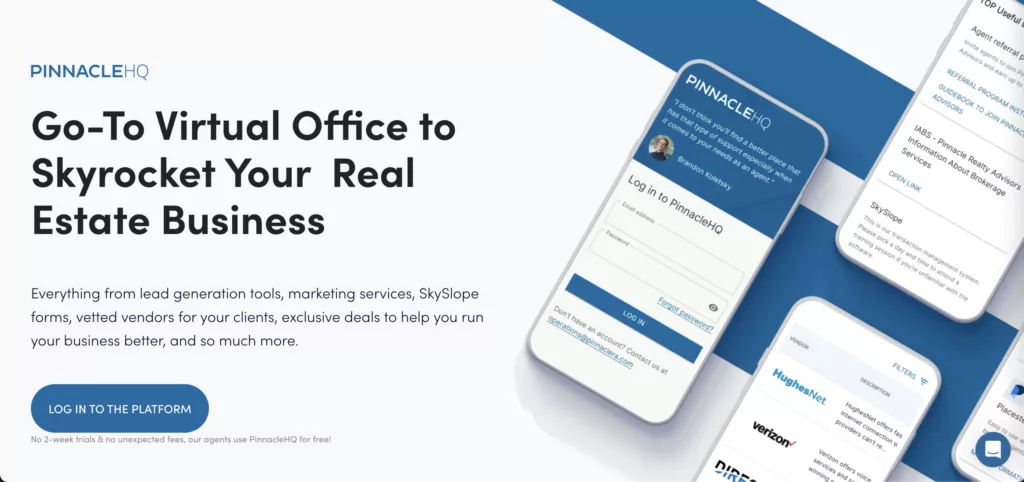In the bustling world of real estate, the journey to success is paved with strategic choices and robust support systems. As an agent, aligning yourself with a brokerage that offers a comprehensive suite of services can be a game-changer. In this detailed guide, we unravel the top10 brokerage services that are not just essential but transformative for every real estate agent. Let’s embark on this journey to unlock the secrets to skyrocketing your real estate success!
Here are the top10 brokerage services that are vital for real estate agents and realtors:
- Lead Generation: Providing agents with quality leads through various strategies including digital marketing and community networking.
- Training and Education: Offering a rich repository of resources such as seminars, workshops, and online courses that cover a range of topics from market trends to legal compliance.
- Marketing Support: Extending comprehensive marketing support that encompasses both digital and traditional channels, aiding in brand amplification.
- Technology Tools: Equipping agents with a suite of technology tools that streamline operations and enhance efficiency, including CRM systems and virtual tour software.
- Legal and Compliance Support: Offering support in the form of legal consultations, contract reviews, and compliance checks to ensure alignment with the regulatory framework.
- Transaction Coordination: Providing meticulous coordination services that handle administrative tasks and liaise with various parties involved, ensuring a smooth transaction process.
- Commission Splits: Offering flexible commission split models, including traditional and flat fee structures, to maximize agents’ earnings.
- Customer Relationship Management (CRM): Facilitating the management of contacts efficiently, identifying sales opportunities, and streamlining processes to build long-term relationships.
- Branding Assistance: Assisting in the development of a powerful personal brand through various initiatives including logo design, website development, and strategic branding initiatives.
- Back Office Support: Offering a range of services including administrative assistance, paperwork handling, and virtual office solutions like PinnacleHQ to streamline business operations.
These services are designed to support agents in various aspects of their business, helping them to succeed in the competitive real estate market.
1. Lead Generation: Your Gateway to Unlimited Opportunities
In the real estate sector, the journey to success begins with a solid lead. Lead Generation is not just a service; it’s a dynamic strategy that connects you with potential clients eager to make informed decisions in the property market. Brokerages employ a myriad of techniques to generate quality leads that match your expertise and service area. Here are the top 5 concrete examples of lead generation techniques:
- Content Marketing: Creating informative blogs, ebooks, and webinars that address common questions and concerns of home buyers and sellers. For instance, a blog post on “Top 10 Tips for First-Time Home Buyers” can attract potential clients to your website.
- Social Media Advertising: Leveraging platforms like Facebook and Instagram to run targeted ads that reach potential clients in specific geographical areas or demographic groups. Learn more about social media advertising strategies here.
- SEO Optimization: Implementing SEO strategies to enhance your website’s visibility on search engines, attracting organic traffic through keywords and phrases commonly used by individuals looking for real estate services. Find SEO tips for real estate here.
- Community Networking: Participating in community events and networking groups to build a strong local presence and connect with potential clients. Engaging with the community not only builds trust but also fosters relationships that can lead to referrals. Learn more about community networking here.
- Email Marketing: Crafting personalized email campaigns that offer value to potential clients, keeping them informed about market trends, new listings, and real estate tips. Discover effective email marketing strategies here.
By tapping into a rich pool of leads through these strategies, you set the stage for fruitful collaborations and successful transactions, fostering relationships that could last a lifetime.
Tips for Maximizing Lead Generation:
- Utilize social media platforms to connect with a broader audience.
- Offer value through informative blogs and newsletters.
- Engage in community events to build a local network.

2. Training and Education: Sharpening Your Competitive Edge
In the ever-evolving landscape of real estate, staying ahead means committing to continuous learning. Training and Education are pivotal in shaping a successful career. Brokerages often offer a rich repository of resources to foster growth and expertise in agents. Here are some concrete avenues through which brokerages facilitate training and education:
- Online Courses: Brokerages often facilitate access to specialized real estate schools that offer a plethora of courses covering various aspects of the industry, from market analysis to negotiation skills. Here are a few platforms where you can find industry-specific courses:
- Real Estate Express: Offers accredited pre-license, exam preparation, post-license, and continuing education courses.
- The CE Shop: Specializes in real estate education with a range of courses including pre-licensing, post-licensing, and continuing education.
- Kaplan Real Estate Education: Provides comprehensive real estate training with options for live classroom training, online courses, and textbooks.
- 360training: Offers a variety of real estate pre-license, post-license, and continuing education courses online.
- National Association of Realtors (NAR) e-PRO® Certification: Offers training in real estate technology to help agents grow their business.
By enrolling in courses from these specialized platforms, agents can enhance their knowledge and skills, staying abreast of the latest developments in the real estate industry.
- Seminars and Workshops: Regular seminars and workshops conducted by industry experts provide insights into the latest trends and developments in the real estate sector. Websites like Eventbrite often list upcoming real estate seminars and workshops in various regions.
- Mentorship Programs: Many brokerages run mentorship programs where experienced agents guide newcomers, helping them navigate the initial challenges and setting them up for success. Learn more about the importance of mentorship in real estate here.
- Webinars: Webinars are a great way to gain knowledge from the comfort of your home. They cover a range of topics from market trends to legal compliance. You can find a list of upcoming webinars on platforms like Real Estate Webinars.
- Industry Publications: Keeping abreast of industry publications can provide you with valuable insights and data to inform your strategies. Websites like Inman, The Real Deal, RealTrends, Real Estate News and Realtor Magazine are excellent resources for the latest news and trends in the real estate industry.
Tips for Enhancing Training and Education:
- Participate in webinars and online forums to gain diverse perspectives.
- Seek mentorship from experienced professionals in the industry.
- Stay updated with the latest literature and case studies in real estate.
By embracing these opportunities for training and education, you not only enhance your knowledge base but also sharpen your competitive edge, positioning yourself as a knowledgeable and reliable agent in the industry.

3. Marketing Support: Amplifying Your Business Growth
In a world where digital presence is paramount, Marketing Support stands as a pillar of success in the real estate industry. Brokerages often extend comprehensive marketing support, encompassing both digital and traditional channels, to help agents carve out a strong presence in the market. Here are some concrete strategies and resources that brokerages might employ to amplify your brand presence:
- Digital Marketing Campaigns: Brokerages often assist in crafting and executing digital marketing campaigns that utilize SEO, content marketing, and social media platforms to reach a wider audience. Learn more about crafting effective real estate digital marketing campaigns here.
- Video Marketing: Creating engaging video content for property showcases, client testimonials, or informational videos can significantly enhance your brand’s visibility. Platforms like BombBomb and BIGVU offer tools to create professional-looking videos with ease, making it a popular choice for real estate agents.
- Social Media Management: Brokerages may offer support in managing your social media profiles, helping you maintain a consistent and engaging presence. Tools like Sprout Social and Hootsuite offer industry-specific features that can assist in crafting a successful social media strategy in the real estate sector.
- Content Creation and Blogging: Developing a blog with informative content can position you as an industry expert. Consider platforms like Luxury Presence or Placester for setting up a professional blog with a focus on real estate.
- Traditional Marketing Channels: Despite the digital shift, traditional marketing channels like direct mail campaigns, flyers, and networking events still hold value. Learn how to effectively use traditional marketing in real estate here.
Tips for Leveraging Marketing Support:
- Develop a cohesive brand voice that resonates with your target audience.
- Utilize SEO strategies to enhance your online visibility.
- Engage with your audience through regular updates and informative content.
By leveraging these marketing support strategies, you can build a brand that resonates with your audience, fostering trust and recognition in the competitive real estate market.

4. Technology Tools: Streamlining Your Operations
IIn the fast-paced real estate industry, leveraging the right Technology Tools can be a game-changer. Brokerages often equip agents with a suite of technology tools that streamline operations and enhance efficiency, offering clients a seamless and modern real estate experience. Here are some industry-specific tools and resources that can significantly streamline your operations:
- CRM Systems: Real estate-specific CRM systems like Follow Up Boss, Chime or LionDesk help in managing contacts, identifying sales opportunities, and recording service issues, thus centralizing all customer information and interactions.
- Transaction Management Software: In the complex world of real estate transactions, having a reliable transaction management system is crucial. These platforms streamline the process of managing transactions, ensuring compliance, and keeping all parties informed. Tools such as SkySlope, Dotloop and TransactionDesk offer comprehensive solutions that facilitate smooth transactions by managing documents, e-signatures, and workflows, all from a centralized platform. By utilizing transaction management software, agents can significantly reduce administrative workload, allowing them to focus more on client service and closing deals.
- Virtual Tour Software: Tools like Matterport or Zillow 3D Home allow you to create immersive virtual property tours, enhancing the property viewing experience for potential buyers.
- Electronic Signature Platforms: Platforms such as DocuSign and SignNow facilitate seamless and secure electronic signatures, speeding up the contract signing process in real estate transactions.
- Property Management Software: Software like AppFolio and Buildium offer comprehensive solutions for property management, including accounting, leasing, and operations.
- Marketing Automation Tools: Tools such as Real Geeks and ActiveCampaign offer marketing automation solutions tailored for the real estate industry, helping agents to nurture leads and convert them into clients.
Tips for Leveraging Technology Tools:
- Stay updated with the latest technological advancements in the real estate industry.
- Invest in training to effectively use these tools to streamline operations.
- Utilize technology tools to offer a seamless and modern experience to your clients.
By embracing these technology tools, agents can not only streamline their operations but also offer an enhanced experience to their clients, setting a benchmark for modern real estate transactions.

5. Legal and Compliance Support: Navigating the Legal Labyrinth
In the real estate industry, adhering to legal standards and regulations is not just mandatory but also a mark of professionalism and integrity. Legal and Compliance Support is a critical service offered by brokerages to help agents navigate the complex legal landscape of the real estate industry. Brokerages often extend support in the form of legal consultations, contract reviews, and compliance checks, ensuring that your operations align with the regulatory framework. Here are some resources and tools that can assist you in this regard:
- Legal Consultations: Brokerages often provide access to legal experts who specialize in real estate law. Platforms like JustAnswer Real Estate Law can connect you with lawyers for quick consultations on various legal matters.
- Contract Reviews: To ensure that all contracts adhere to legal standards, brokerages may offer contract review services. Websites like Rocket Lawyer offer real estate-specific contract templates and review services.
- Compliance Checks: Brokerages assist in conducting compliance checks to ensure that all transactions adhere to the necessary legal and ethical standards. Organizations like the National Association of Realtors (NAR) offer resources on compliance and ethical standards in real estate.
- Educational Resources: To stay abreast of the latest regulations, brokerages often provide educational resources on legal compliance. Websites like Inman regularly publish articles on legal trends and compliance in the real estate industry.
- Legal Software: Tools like Dotloop not only facilitate transaction management but also help in ensuring compliance by providing features like task templates that adhere to state and local regulations.
Tips for Leveraging Legal and Compliance Support:
- Regularly update yourself on the latest legal developments in the real estate industry.
- Utilize the legal resources and consultations provided by your brokerage.
- Ensure all transactions and contracts adhere to the prevailing legal standards.
By availing of these services, agents can operate with confidence, knowing that they are navigating the legal labyrinth with expertise and due diligence, ensuring a smooth and compliant transaction process.

6. Transaction Coordination: Ensuring Smooth Transactions
In the bustling realm of real estate, Transaction Coordination stands as a beacon of efficiency and professionalism. Brokerages offer meticulous coordination services, handling administrative tasks and liaising with various parties involved, ensuring a smooth and hassle-free experience for both agents and clients. Here are some facets of transaction coordination along with resources that can facilitate seamless transactions:
- Document Management: Brokerages often provide platforms where agents can manage all necessary documents in one place. Tools like Dotloop and SkySlope offer centralized solutions for document management, making the transaction process more organized and efficient.
- Communication with Stakeholders: Effective communication with all parties involved is crucial. Platforms like Slack have real estate-specific channels that facilitate seamless communication between agents, clients, and other stakeholders.
- Scheduling and Appointments: Brokerages often offer tools that assist in scheduling appointments, inspections, and viewings. Tools like ShowingTime are designed to streamline the scheduling process in the real estate industry.
- Escrow Coordination: Ensuring a smooth escrow process is a vital part of transaction coordination. Resources like Escrow.com offer solutions to facilitate secure and smooth escrow transactions in real estate deals.
- Closing Services: Brokerages often collaborate with reliable closing services to ensure a smooth conclusion to the transaction. Websites like ClosingCorp provide comprehensive solutions for closing real estate transactions.
Tips for Effective Transaction Coordination:
- Utilize technology tools to streamline document management and communication.
- Maintain a detailed transaction checklist to ensure all steps are completed timely.
- Collaborate closely with all parties involved to facilitate a smooth transaction process.
By leveraging these resources and services, agents can ensure that each transaction is handled with the utmost professionalism and efficiency, fostering a positive experience for all parties involved.

7. Commission Splits: Maximizing Your Earnings
In the dynamic world of real estate, the structure of commission splits stands as a significant determinant of an agent’s earnings. Traditionally, commission splits have been a point of contention, often eating into the profits of hardworking agents. However, modern brokerages like Pinnacle Realty Advisors are revolutionizing this aspect, offering more lucrative and fair commission structures. Let’s delve into the traditional model and the innovative flat fee model to understand how they impact an agent’s earnings:
Traditional Commission Split Model
Historically, the real estate industry has operated on a commission split model where a significant portion of the commission earned by agents is shared with the brokerage. This model, although prevalent, has been criticized for potentially diminishing the earnings of agents, especially those who close high-value transactions. The traditional model typically involves a varying percentage split, which means the more you earn, the more you might have to share with the brokerage.
Flat Fee (100% Commission) Model
In contrast, the flat fee or 100% commission model, as offered by Pinnacle Realty Advisors, stands as a beacon of change and empowerment for real estate agents. Under this model, agents retain the lion’s share of their commission, paying only a nominal flat fee to the brokerage per transaction. This approach not only maximizes the agent’s earnings but also fosters a sense of independence and entrepreneurship.
The flat fee structure is transparent and straightforward, allowing agents to take home a larger portion of their hard-earned commission. The brokerage offers various plans to suit the needs of different agents, including options with zero monthly fees and a cap on the annual sponsorship fee. This modern approach ensures that agents are rewarded fairly for their efforts, fostering a more collaborative and supportive working environment.
Comparing the Two Models
When we compare the two models, it becomes evident that the flat fee model offers a more equitable solution. It aligns with the interests of agents, encouraging them to grow their business without worrying about escalating commission splits. Moreover, it fosters a sense of partnership between the brokerage and the agents, where the success of one translates to the success of the other.
Tips for Navigating Commission Splits:
- Understand Your Options: Before committing to a brokerage, understand the commission structure and how it can impact your earnings.
- Evaluate Your Business Goals: Choose a commission structure that aligns with your business goals and growth plans.
- Seek Transparency: Opt for brokerages that offer transparent commission structures, avoiding hidden fees and charges.
By embracing the flat fee commission model, agents can truly maximize their earnings, enjoying the fruits of their labor to the fullest extent. It represents a progressive step in the real estate industry, paving the way for a more equitable and prosperous future for real estate professionals.

8. Customer Relationship Management (CRM): Building Lasting Relationships
In the real estate sector, nurturing relationships with clients is not just a strategy, but a cornerstone for sustained success. A robust Customer Relationship Management (CRM) system acts as your canvas, helping you paint a picture of long-term relationships built on trust and mutual respect. CRM systems in real estate are designed to manage contacts efficiently, identify sales opportunities, and streamline processes, fostering relationships that transcend transactions. Here are some aspects of CRM along with resources that can assist you in building lasting relationships:
- Contact Management: CRM systems offer features that help you organize and manage your contacts effectively. Real estate-specific CRM platforms like Follow Up Boss and Chime provide comprehensive solutions for managing client information and communication history.
- Lead Generation and Nurturing: CRM systems assist in identifying and nurturing potential leads. Tools such as Zurple and Zoho CRM for Real Estate offer functionalities that help in capturing leads and nurturing them through personalized communication.
- Marketing Integration: Many CRM systems integrate seamlessly with marketing tools, allowing for targeted marketing campaigns. Platforms like Propertybase offer integrated solutions that combine CRM with marketing automation, facilitating cohesive marketing strategies.
- Analytics and Reporting: CRM systems often come with analytics tools that help in tracking and analyzing customer interactions. Tools like Wise Agent offer features that help in generating insightful reports, aiding in making data-driven decisions.
Tips for Leveraging CRM Systems:
- Choose a CRM system that aligns with the specific needs of the real estate industry.
- Utilize the CRM system to personalize your communication with clients, fostering stronger relationships.
- Leverage the analytics tools in CRM systems to gain insights into customer preferences and behaviors.
By adopting a robust CRM system, real estate agents can build and nurture lasting relationships with clients, setting the foundation for a successful and sustainable business.

9. Real Estate Agents and the Power of Personal Branding
In the dynamic and competitive world of real estate, establishing a potent personal brand stands as a beacon of professionalism and individuality. Branding Assistance, facilitated by forward-thinking brokerages, nurtures the creation of a personal brand that resonates deeply with your target audience, embodying both authenticity and appeal. Here, we delve into why personal branding is pivotal for real estate agents, why it centers on the individual rather than the brokerage, and the manifold benefits it brings.
Why is Personal Branding Important for Real Estate Agents?
Personal branding transcends mere logos and websites; it encapsulates the unique narrative that each agent brings to the table. It serves as a powerful tool to foster trust and cultivate enduring relationships with clients, allowing agents to spotlight their expertise, articulate their values, and forge deeper connections with their audience. In the real estate sector, a well-articulated personal brand can become an agent’s most significant asset, distinguishing them from competitors, showcasing a unique approach, and fostering a reputation that encourages referrals and repeat business.
It’s About You, Not Your Brokerage
While brokerages provide the necessary support and resources, the essence of personal branding is inherently individualistic. It’s about carving out a distinct identity that mirrors your personality, expertise, and values. This individual-centric approach ensures that agents are not overshadowed by the brokerage’s brand but instead shine in their light, offering a personalized service that resonates with clients on a personal level. By focusing on building a personal brand, agents can create a unique space in the market, where their individuality becomes their strongest selling point, fostering a business model that thrives on personal connections and trust.
Benefits of Personal Branding for Real Estate Agents
- Enhanced Trust and Credibility: A strong personal brand helps in building trust and establishing credibility in the market, as clients often prefer working with agents who have a well-defined and trustworthy brand identity.
- Increased Referrals and Repeat Business: Personal branding fosters a reputation that encourages referrals and repeat business, as satisfied clients are more likely to recommend an agent with a strong personal brand.
- Effective Marketing: A potent personal brand amplifies marketing efforts, making campaigns more resonant and effective by aligning them with the agent’s unique value proposition.
- Personal Fulfillment and Growth: Crafting a personal brand offers a sense of fulfillment and growth, as agents can build a business that aligns with their values and aspirations.
Tips for Effective Branding Assistance:
- Understand Your Unique Value Proposition: Identify and accentuate what sets you apart in the real estate market.
- Build a Consistent Narrative: Develop a cohesive narrative that encapsulates your values, expertise, and approach.
- Leverage Brokerage Support: Collaborate closely with your brokerage to utilize the branding resources and support available effectively.
- Engage with Your Audience: Utilize various platforms to engage with your audience, sharing insights and fostering trust.
- Seek Continuous Growth: Focus on continuous growth and adaptation, keeping your brand fresh and relevant in the evolving market landscape.
By embracing branding assistance, agents can craft a personal brand that not only distinguishes them in the market but also nurtures trust and loyalty among clients, paving the pathway for a successful and sustainable real estate career.

10. Back Office Support: Your Support System for Success
In the bustling world of real estate, agents often find themselves juggling various responsibilities that go beyond client interactions and property showings. This is where the role of Back Office Support becomes instrumental. These services, ranging from administrative assistance to meticulous handling of paperwork, act as the backbone of your business, allowing you to focus on your core activities without getting bogged down by administrative hassles. Let’s delve deeper into the components of back office support and the resources that can bolster your real estate business:
- Administrative Assistance: Efficient administrative support is vital in managing day-to-day operations. Services like VirtuDesk offer virtual assistants specialized in real estate, helping you manage tasks such as appointment scheduling and data entry.
- Paperwork and Transaction Coordination: Handling paperwork is a significant part of back office support. Platforms like Skyslope and Dotloop provide real estate transaction management solutions, streamlining the process of handling contracts and documentation.
- Accounting and Financial Management: Keeping track of financial transactions is crucial in real estate. Tools like BrokerSumo offer solutions tailored for real estate brokerages, assisting in commission tracking and financial management.
- Technology Support: Modern back office support extends to technology assistance, helping agents navigate various software and tools. Resources like RE Technology offer insights and reviews on the latest technology trends in the real estate sector.
- Marketing Support: Back office services often encompass marketing support, assisting agents in crafting effective marketing strategies. Platforms like Placester offer real estate marketing solutions, helping agents create compelling marketing campaigns.
- Virtual Office: In the digital age, the concept of a virtual office has gained prominence. It serves as a hub where agents can access a range of services and tools remotely, facilitating seamless business operations. One notable platform offering virtual office solutions is PinnacleHQ, a virtual office and marketplace that integrates various services, making it easier for agents to manage their business efficiently from anywhere.
Tips for Leveraging Back Office Support:
- Choose Specialized Services: Opt for services that specialize in real estate to ensure that your back office support understands the nuances of the industry.
- Invest in Technology: Leverage technology to streamline back office operations, enhancing efficiency and productivity.
- Focus on Core Activities: Utilize back office support to free up time, allowing you to focus on core activities like client interactions and property showings.
By integrating robust back office support, real estate agents can build a streamlined and efficient business model, paving the way for success in the competitive real estate market.
Conclusion: Your Pathway to Unparalleled Success
In conclusion, the top 10 brokerage services are your golden ticket to unparalleled success in the real estate industry. By aligning yourself with a brokerage that offers these comprehensive services, you pave the way for a career that is both profitable and fulfilling. Remember, in the competitive world of real estate, the right support can make all the difference.
As you embark on this journey of growth and success, remember that these services are designed to facilitate your journey, offering you the tools, support, and resources to carve out a successful career in the real estate sector. Choose a brokerage that understands your needs and supports your ambitions, and watch your real estate career soar to new heights.
Step into a future of success and growth with a brokerage that understands your needs and supports your ambitions. Discover the transformative power of top-notch brokerage services and unlock the secrets to skyrocketing your real estate success. The future is bright, and it’s yours to seize. Get started today!
